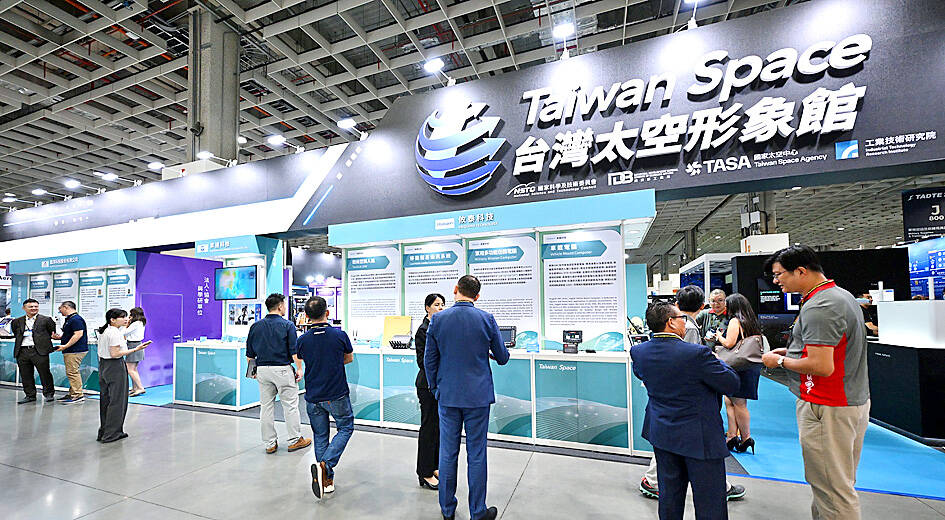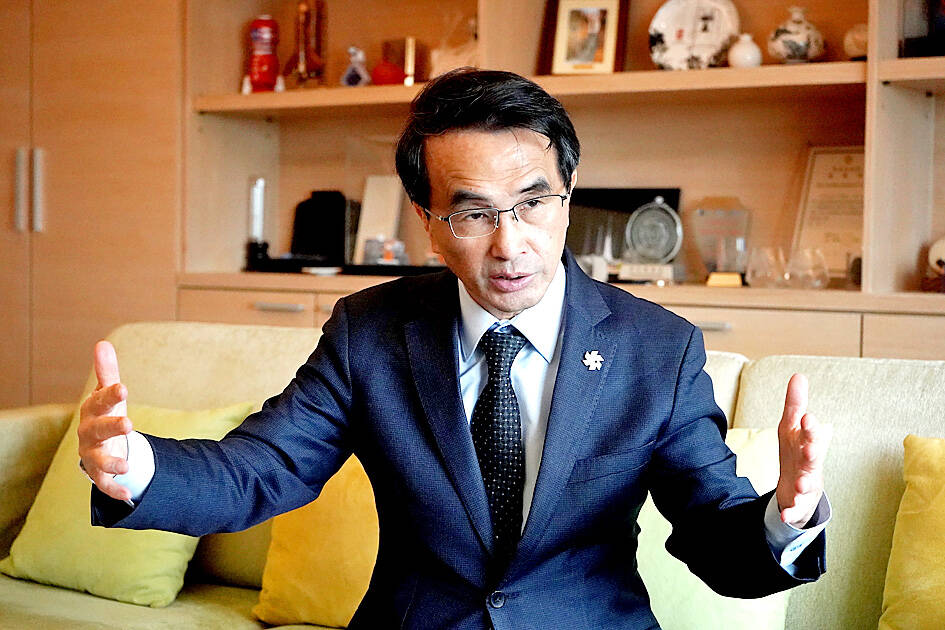The Taiwan Space Agency (TASA) yesterday said it plans to launch six low Earth orbit satellites starting in 2026 as part of the government’s plan to boost the resilience of the nation’s communications.
The development of the technology gained attention after Ukrainians were able to access the Internet through Space Exploration Technologies Corp (SpaceX) CEO Elon Musk’s Starlink satellite service, despite their infrastructure being severely damaged in the war with Russia.
Two of the satellites would be built by the government, while four would involve cooperation between TASA and private contractors.

Photo courtesy of the Industrial Technology Research Institute
“Over the past 30 years, the satellite technology in Taiwan has mostly been used for remote sensing and meteorological observations,” National Science and Technology Council Minister Wu Tsung-tsong (吳政忠) said.
“The research and development of communications satellite technology is indeed challenging, as it is complicated and fast-changing. As such, the government needs to take the lead, which is why it has extended the Phase III space project to 2031 and added NT$40 billion [US$1.23 billion] to the budget,” he said.
TASA Director-General Wu Jong-shinn (吳宗信) said the agency plans to launch the first low Earth orbit satellite in 2026 using a SpaceX rocket and the second one in 2028.

Photo: CNA
The first satellite’s body would be made in Taiwan, but the Ka bend communication payload would be built in partnership with an overseas contractor, he said.
The second satellite would be jointly developed by the Industrial Technology Research Institute, which is capable of developing 4G and 5G systems, and TASA, Wu Jong-shinn said.
The total budget to launched the two rockets is NT$900 million, he said, adding that the agency hopes that the contracts for the four other satellites will be placed on auction this year.
Aside from Starlink, there are other low Earth orbit satellite service providers, many of whom are eager to set up ground stations in Taiwan.
“However, we have to try to develop the technology ourselves. That way, we would not be worried if some companies refuse to transfer it to us,” Wu Jong-shinn said.
The launch of the six low Earth orbit satellites, known as project “Beyond 5G (B5G),” would only be the beginning, Wu Tsung-tsong said.
Simulations have shown that if there are two low-orbit communication satellites, they would only hover over Taiwan for three to five minutes when orbiting the Earth, he said.
“To achieve uninterrupted communication 24 hours a day, it is obvious that six satellites would not be enough. Taiwan needs at least 120 satellites to build communications resilience,” he said.
The next step is to build up the satellite communications industry, which not only includes existing electronics industry operators, but also new entrepreneurs, Wu Tsung-tsong said.
“They will see that telecommunications business opportunities in the next 10 or 20 years will be in space,” he said.
“Taiwan’s space ground equipment industry is already of considerable scale, with an output value exceeding NT$200 billion, but there is still a lot of room for growth in satellite manufacturing, rocket launch services and other fields,” he said. “Like a baseball player who can pitch and hit, Taiwan must be skilled on the ground and in space.”

CHAOS: Iranians took to the streets playing celebratory music after reports of Khamenei’s death on Saturday, while mourners also gathered in Tehran yesterday Iranian Supreme Leader Ayatollah Ali Khamenei was killed in a major attack on Iran launched by Israel and the US, throwing the future of the Islamic republic into doubt and raising the risk of regional instability. Iranian state television and the state-run IRNA news agency announced the 86-year-old’s death early yesterday. US President Donald Trump said it gave Iranians their “greatest chance” to “take back” their country. The announcements came after a joint US and Israeli aerial bombardment that targeted Iranian military and governmental sites. Trump said the “heavy and pinpoint bombing” would continue through the week or as long

TRUST: The KMT said it respected the US’ timing and considerations, and hoped it would continue to honor its commitments to helping Taiwan bolster its defenses and deterrence US President Donald Trump is delaying a multibillion-dollar arms sale to Taiwan to ensure his visit to Beijing is successful, a New York Times report said. The weapons sales package has stalled in the US Department of State, the report said, citing US officials it did not identify. The White House has told agencies not to push forward ahead of Trump’s meeting with Chinese President Xi Jinping (習近平), it said. The two last month held a phone call to discuss trade and geopolitical flashpoints ahead of the summit. Xi raised the Taiwan issue and urged the US to handle arms sales to

State-run CPC Corp, Taiwan (CPC, 台灣中油) yesterday said that it had confirmed on Saturday night with its liquefied natural gas (LNG) and crude oil suppliers that shipments are proceeding as scheduled and that domestic supplies remain unaffected. The CPC yesterday announced the gasoline and diesel prices will rise by NT$0.2 and NT$0.4 per liter, respectively, starting Monday, citing Middle East tensions and blizzards in the eastern United States. CPC also iterated it has been reducing the proportion of crude oil imports from the Middle East and diversifying its supply sources in the past few years in response to geopolitical risks, expanding

Pro-democracy media tycoon Jimmy Lai’s (黎智英) fraud conviction and prison sentence were yesterday overturned by a Hong Kong court, in a surprise legal decision that comes soon after Lai was jailed for 20 years on a separate national security charge. Judges Jeremy Poon (潘兆初), Anthea Pang (彭寶琴) and Derek Pang (彭偉昌) said in the judgement that they allowed the appeal from Lai, and another defendant in the case, to proceed, as a lower court judge had “erred.” “The Court of Appeal gave them leave to appeal against their conviction, allowed their appeals, quashed the convictions and set aside the sentences,” the judges